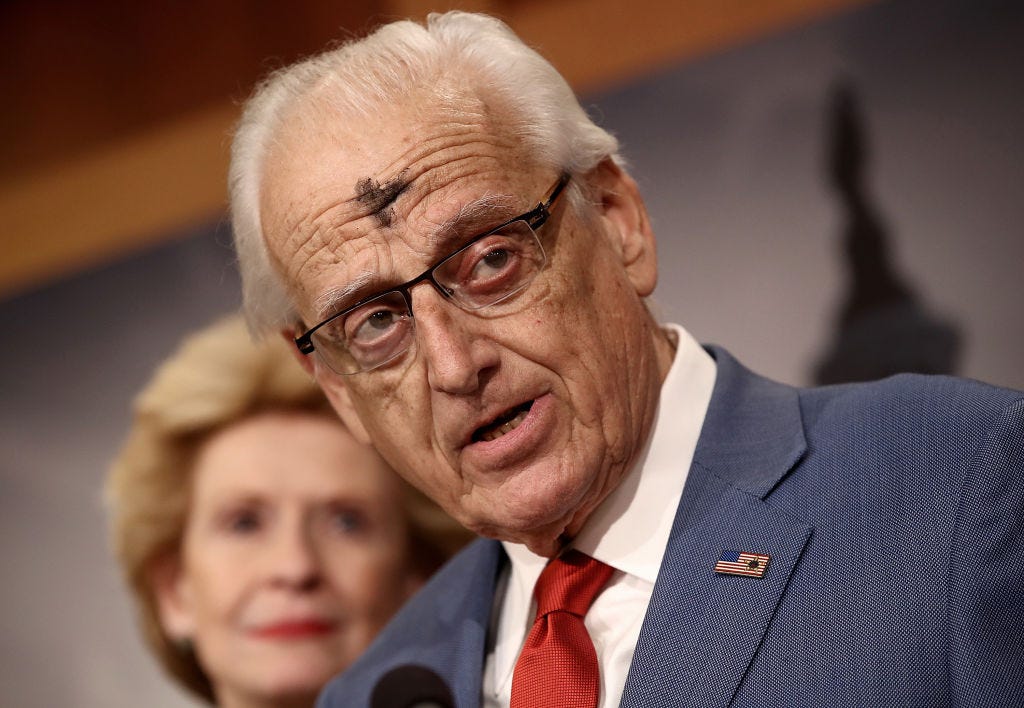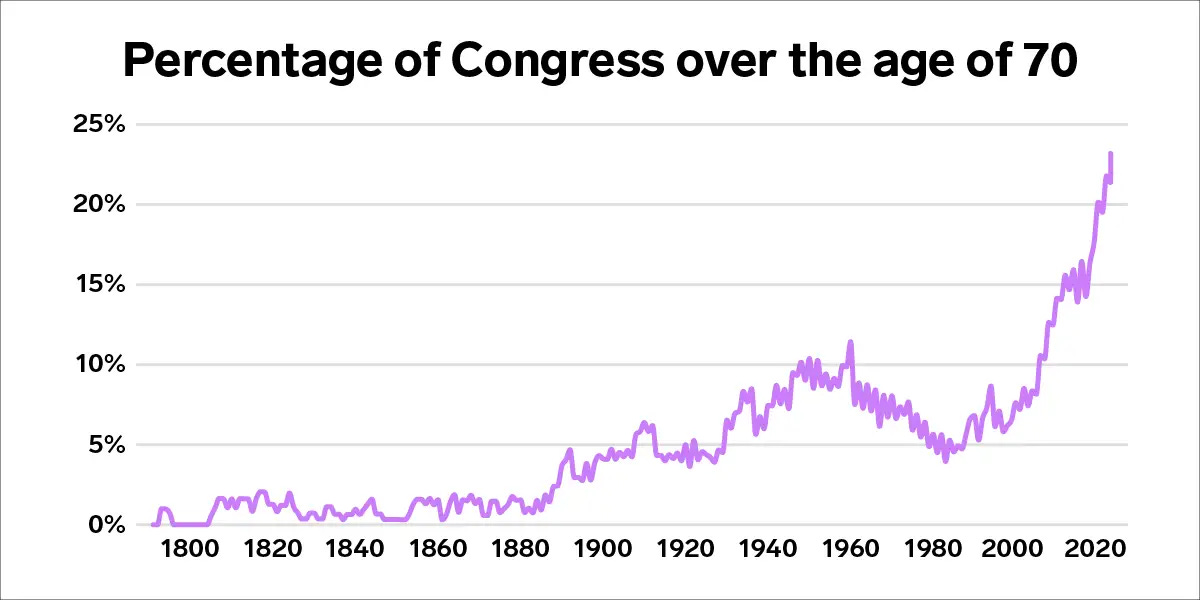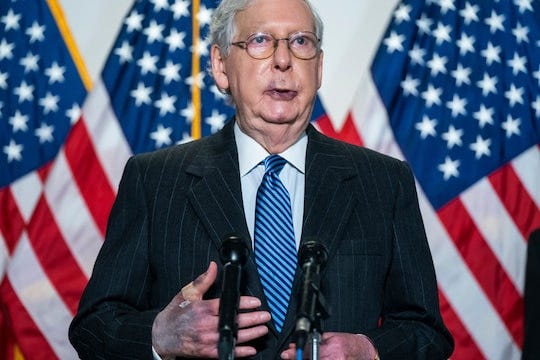Amid his reelection bid for a 15th term, New Jersey congressman Bill Pascrell Jr., age 87, died this week due to complications from a fever. Even at 87, Pascrell wasn’t the oldest member of Congress, just one in a group of over a dozen octogenarians exercising a death grip on their positions of power.
Earlier this month, 85-year-old Maryland congressman Steny Hoyer suffered a stroke. But that hasn’t stopped him from seeking his 23rd term in the House of Representatives. This comes on top of the death of Dianne Feinstein last year, the 90-year-old Senator from California and chair of the powerful Judiciary Committee. And there’s another 90 year old, Iowa Senator Charles Grassley, who’s going to be 91 next month and has been gathering cobwebs since the Reagan administration.
Forget gerontocracy (rule by the elderly). I call this mortocracy — rule by the dying. How did Congress become a hospice care facility?
There’s been a sharp rise in the past decade or so in the number of elderly members of Congress, with nearly a quarter of them now over age 70. (For comparison, in 1980, just 5 percent of congresspeople were over age 70.) Since the average life expectancy in the U.S. is 76, is it any wonder that we are seeing our elected officials decline or even die in office?
All of this in a year when voter concerns about President Joe Biden’s age of 81 were so acute that he ultimately relented and made the extraordinary decision to end his campaign for reelection. But for some reason, the same concerns don’t seem to apply to Congress. A dozen congresspeople are older than Biden, and all but one are running for reelection. (Rep. Grace Napolitano announced her intention to retire.) Here’s who they are, ranked from oldest to youngest:
Sen. Charles Grassley (R-Iowa) - 90 years old
Rep. Grace F. Napolitano (D-California) - 87 years old
Rep. Eleanor Holmes Norton (D-District of Columbia) - 87 years old
Rep. Hal Rogers (R-Kentucky) - 86 years old
Rep. Maxine Waters (D-California) - 86 years old
Rep. Steny Hoyer (D-Maryland) - 85 years old
Rep. Nancy Pelosi (D-California) - 84 years old
Rep. James E. Clyburn (D-South Carolina) - 84 years old
Rep. Danny K. Davis (D-Illinois) - 82 years old
Sen. Bernie Sanders (I-Vermont) - 82 years old
Rep. John Carter (R-Texas) - 82 years old
Sen. Mitch McConnell (R-Kentucky) - 82 years old
Due to their seniority, these officials often serve in important leadership positions. When Sen. Feinstein passed away last year, the Judiciary Committee she had chaired was suddenly without a leader. This left her party uncertain of how to proceed with the confirmation of judicial nominees. Their confirmation had already been put on hold for months due to her hospitalization.
Up until 2023, 90-year-old Grassley served as Senate President pro tempore, placing him third in the presidential line of succession, behind only the Vice President and the Speaker of the House. That was his position on January 6th, when the Capitol building was inundated with protestors and he and Nancy Pelosi were secretly evacuated to Fort Lesley J. McNair miles away. Pelosi was then Speaker of the House, a role she held until 2023.
Also through 2023, Hoyer served as House Majority Leader and Clyburn as House Majority Whip. McConnell currently serves as Senate Minority Leader, despite two episodes in which he froze while speaking publicly and whatever happened to his hands as captured in the photo taken in 2020 below. (McConnell refused to explain at the time.)
Several of these roles are entitled to highly classified intelligence briefings that involve secrets so sensitive that the rest of Congress aren’t even allowed to know about them. The so-called “Gang of Eight” includes the Speaker and Minority Leaders of the House, as well as the Majority and Minority Leaders of the Senate.
Last year, the Pentagon-funded RAND Corporation published a study warning that dementia among U.S. officials is a national security threat, as I’ve written about previously. Due to advancements in medical science, officials are living longer. But as the RAND study warns, there aren’t really any safeguards in place to prevent senile officials from continuing to access sensitive information and inadvertently divulging them.
If the integrity of secrecy is a concern, how about the prospect of the laws that govern our country being written by people who can’t remember where they are? It’s a question that is clearly on millions of Americans’ minds, with strong bipartisan majorities consistently expressing support for mandatory retirement ages for members of Congress, per polling.
It’s hard to imagine Congress passing such a law. But Biden’s withdrawal, once cast by Washington as politically impossible, shows us that even the most powerful leaders can bow to public pressure. At a time when much of the country is celebrating a new generation in Kamala Harris, there is an open question as to whether the country’s new mood applies to our mortocracy in Congress. Mentally aware and capable or not, all stand in the way of a next generation.
— Edited by William M. Arkin
Correction: Multiple members of Congress are in fact a year older than initially described. (None were younger.) The members include Sen. Mitch McConnell and Reps. Holmes Norton, Rogers, Waters, Hoyer, Pelosi, Clyburn, and Carter. This story has been updated to correct the error.






As a member of GenX,you have NO idea how many people are disgusted that we haven't even been given an opportunity to move up. Our grandparents were retiring at some of our ages! We need a forced retirement age. I'm sorry if that sounds mean. I don't want it to, but it's true.
Thanks for your always thoughtful analysis, Ken! On one hand, you’re right to describe “octogenarians exercising a death grip on their positions of power.”
On the other hand, that critique might be too broad and narrow at the same time. I wrote a few months ago to explore public concerns about gerontocracy in Washington, and how they both reach too far while also falling short of identifying the root of the problem. https://shahidbuttar.substack.com/p/neither-mcconnell-freezing-nor-biden
In “Neither McConnell freezing, nor Biden rambling, is the problem” I explored the disturbing patterns visible across figures, including Biden, Feinstein, McConnell, and Trump, before explaining that:
“to describe Washington as a gerontocracy is frankly charitable.
Concerns about gerontocracy center on mental fitness, and the capacity of people as they advance in age to execute their duties. Each of the figures above have revealed their unfortunate incapacity.
But their individual incapacity is just part of the problem, ultimately akin to the part of an iceberg that looms above the water.”
That post continued by exploring structural impediments to meaningful democracy in America. I’d be curious to invite any thoughts you or others might have.
Keep up the good work!